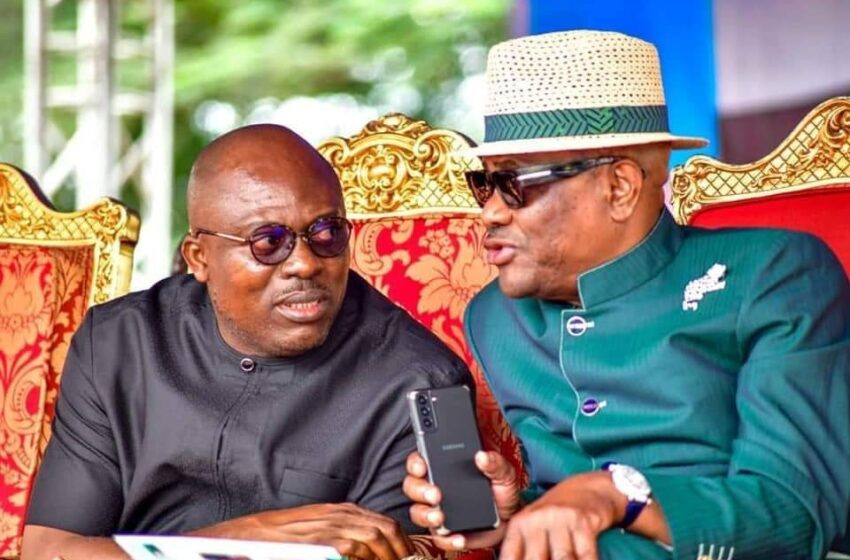Tinubu brokers peace in Rivers: 4 conditions for Fubara’s reinstatement as governor

Nyesom Wike and Siminalayi Fubara continue to make headlines as Rivers state crisis worsens. Photo credit: Punch Newspaper.
In a fresh twist to the prolonged political crisis rocking Rivers State, President Bola Ahmed Tinubu has reportedly brokered a conditional truce between Governor Siminalayi Fubara and his estranged political godfather, Nyesom Wike.
The agreement, which allows Fubara to remain in office, comes with four major concessions that signal a significant compromise from the embattled governor.
Background: Rivers Political Crisis
Since late 2023, Rivers State has been engulfed in a fierce power tussle between Fubara and his predecessor-turned-FCT Minister, Nyesom Wike. Once allies, the duo became locked in a bitter political war barely months after Fubara assumed office. The fallout led to mass defections in the State House of Assembly, the suspension of 27 lawmakers loyal to Wike, threats of impeachment, and escalating governance gridlock.
The infighting drew national attention, prompting President Tinubu to wade in to prevent a complete breakdown of governance in the oil-rich state.
The Deal: Four Key Conditions for Peace
According to insider reports and sources quoted by Punch Newspaper, Tinubu’s peace plan includes four core conditions that Governor Fubara must accept to remain in office:
1. No Second Term for Fubara
As part of the resolution, Fubara has reportedly agreed to forgo any ambition of seeking re-election in 2027. This condition ensures that Wike and his political structure will have a clear path to determine the next governor of Rivers State, potentially restoring his grip on the state’s political machinery.
Analysts say this is a major concession and reflects the extent of the pressure on Fubara to retain his current seat.
2. Wike to Nominate All 23 LGA Chairpersons
Under the new arrangement, Wike will have the exclusive right to nominate all chairpersons for the 23 Local Government Areas in Rivers State. The chairmanship seats had become a new flashpoint in recent weeks after the expiration of the previous tenure and Fubara’s refusal to extend or recognise their continued stay.
This clause significantly limits the governor’s influence at the grassroots level, effectively handing control of local governance to Wike.
3. Settlement of Entitlements to Pro-Wike Lawmakers
Fubara has also agreed to pay all outstanding allowances and entitlements owed to the 27 lawmakers who defected to the APC from the PDP and are believed to be loyal to Wike. These lawmakers had been suspended by the faction of the Assembly aligned with Fubara and were excluded from legislative activities.
The payment is seen as a reconciliation gesture and part of broader efforts to restore legislative stability.
4. No Impeachment Moves from Lawmakers
In return, the 27 lawmakers will cease any plans to impeach Fubara, ensuring that he completes his four-year term without further political threats from the Assembly.
This condition is a critical part of the truce, given that impeachment was actively on the table earlier this year, with Wike’s loyalists controlling a majority of the Assembly before the crisis peaked.
What Tinubu Said: “We’ve All Agreed to Work Together”
Speaking on the peace efforts, President Tinubu was quoted as saying that “all parties have agreed to work together,” suggesting that the presidency sees this as a political win for stability.
Meanwhile, Wike also confirmed to journalists that a consensus had been reached, saying: “We’ve agreed to work together with Fubara for the good of the people of Rivers State.” However, he stopped short of confirming the specific conditions publicly.
Public Reactions: Mixed Feelings Over the Deal
The peace pact has sparked widespread debate across the state and the country. While some have hailed it as a pragmatic solution to prevent further political chaos in Rivers, others have criticised it as a capitulation of democratic principles.
Many observers argue that the agreement effectively undermines the independence of the governor’s office, reduces Fubara to a lame-duck leader, and solidifies Wike’s position as the de facto political kingmaker of the state.
Civil society groups and pro-democracy advocates have raised concerns over executive subjugation, with calls for greater transparency in how such deals are brokered in a democratic system.
Implications Ahead of 2027
Fubara’s reported decision not to run in 2027 opens up the political space for Wike’s loyalists or new contenders to position themselves as successors. It also raises questions about the sustainability of such peace deals and whether Rivers can move beyond personality-driven politics.
Observers will also be watching closely to see whether Fubara will retain any real autonomy going forward or simply serve as a caretaker governor under Wike’s shadow.
Conclusion: A Fragile Truce or a Turning Point?
President Tinubu’s intervention has, for now, prevented a full-blown political meltdown in one of Nigeria’s most strategic states. But the conditions of this peace come with high political costs—especially for Fubara, whose leadership has been severely constrained.
Whether this truce holds or collapses under future pressure remains to be seen. What is certain is that Rivers State’s politics has entered a new, delicate chapter, with power recalibrated and ambitions redefined.

